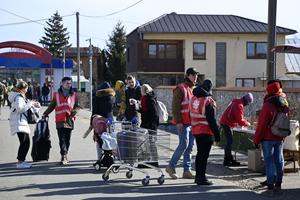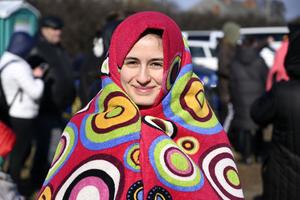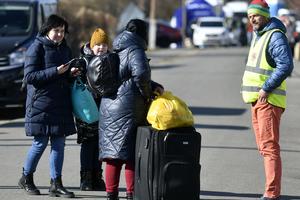Questions
I want to arrive in Slovakia, where can I cross the border?
What are the waiting times at the borders?
I do not have a passport, can I cross the border?
I have a pet, can I bring it with me?
My son is 20-year-old, will he be allowed to cross the border?
How does it look at the border once I cross? Are there any facilities where I can rest?
I have a family (friend, arranged contact) who will pick me up, how do I proceed?
I have to rely on public transport, where and when is a bus or a train leaving?
Are there any coronavirus-related measures in place I have to follow upon my arrival?
I am only transiting Slovakia, what should I do?
I want to stay in Slovakia, how do I proceed?
How do I find accommodation?
Can I apply for a job in Slovakia? Are there any conditions I need to meet?
I need to go to the hospital, should I pay for a doctor's appointment?
I withdrew hryvnias in Ukraine, where can I exchange them for euros?
Can my underage children be enrolled in kindergarten and school? How do I proceed?
Is the Ukrainian Embassy in Slovakia open? How can I contact them?
Borders
I want to arrive in Slovakia, where can I cross the border?
There are three open border crossings between Slovakia and Ukraine: Ubľa - Malyj Bereznyj, Veľké Slemence – Mali Selmenci, Vyšné Nemecké – Užhorod.
Please note that the Veľké Slemence border crossing is open only for pedestrians, the remaining two open for cars.
What are the waiting times at the borders?
It is hard to say, as the situation is ever-changing. You can follow the Facebook page of the Slovak Police, where they update information about borders every morning, including how many people crossed the border.
Refugees arriving in Slovakia often experience lengthy waiting, sometimes for days. This is, according to Slovak authorities and journalists working on the spot, due to thorough checks on the Ukrainian side. Once people cross the border, the process in Slovakia is shorter.
I do not have a passport, can I cross the border?
Yes, you can. Entry to Slovakia is possible for everyone fleeing the war in Ukraine. The border check is longer in case you turn up at the border without your passport. The Interior Ministry explained that they are taking people's fingerprints on the spot.
People without valid passports are recommended to bring some other IDs with them, such as their national ID, driving license, residence permit, birth certificates of children, etc.
I have a pet, can I bring it with me?
Yes, people are bringing their pets across the border. There is a veterinary point at the large-capacity centre in Michalovce where volunteers provide fodder for animals and basic veterinary care.
My son is 20 years old, will he be allowed to cross the border?
Most likely not. Men ages 19 to 60 fall under general mobilisation in Ukraine and cannot leave the country. There are exceptions, which include men who take care of three and more underaged children or are not eligible for the military due to a medical condition.
Once in Slovakia
How does it look at the border once I cross? Are there any facilities where I can rest?
Yes, people who cross the border will meet volunteers and state institutions offering humanitarian aid. There are heated tents where people can sit and rest. Volunteers provide food and warm drinks. The inhabitants of Slovakia made a collection comprised of diverse material help, so there are free goods on the spot, such as nappies, toiletries, durable food, clothes and toys.
Volunteers navigate people on where to go and what can be arranged at the spot.
I have a relative/friend/contact who will pick me up at the border, how do I proceed?
Basically, you just need to agree with your contact on the pick-up spot and leave with them. There is no checking of people who are leaving and with whom.
I have to rely on public transport, where and when is a bus or a train leaving?
Transport from the border crossing to temporary accommodation is coordinated at the spot. There are buses, taxi services, even volunteers who come with their cars to drive people if needed.
Some municipalities and bus services provide shuttle service for free.
The Košice Region, for example, organises free buses from Vyšné Nemecké and Veľké Slemence, which will drive people to Košice or Michalovce, bigger cities in Slovakia with better infrastructure than villages near the borders.
Ask at the spot where you should wait for a bus or a car.
The police have warned refugees to be cautious, especially when sitting in a car with someone you do not know.
Are there any coronavirus-related measures in place I have to follow upon my arrival?
There are Covid-related measures in Slovakia in place in general, but many do not apply for refugees. When crossing the Slovak-Ukrainian border, it is not required to fill in the eHranica passenger locator form, neither do people need to have a negative test or proof of vaccination. This solely applies when crossing the Slovak-Ukrainian border, all other people arriving to Slovakia have to present either a proof of vaccination or recovery, or enter quarantine and fill in an eHranica.
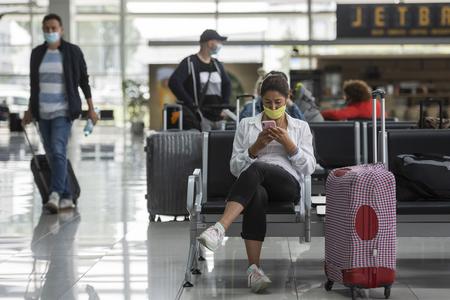
In Slovakia it generally applies that people have to cover their mouth and nose with FFP2 respirator indoors, observe social distancing and disinfect their hands. There are no limits on mass events, no restrictions on opening hours, neither is there a need to present a certificate of vaccination or recovery.
Once you test positive, you have to isolate yourself for at least five days or as long as the symptoms last. Your closest contacts (people you live with in the same household) have to be isolated with you. This does not apply if they are fully-vaccinated and have no symptoms of the disease.
I am only transiting Slovakia, what should I do?
You should arrange your travel on your own. Volunteers at the spots, for example, at the Košice train station, can navigate you. There is also an information point at Bratislava's Main Railway Station.
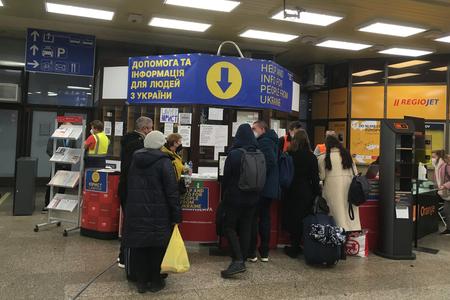
There is free transport for Ukrainian refugees at the trains run by the national carrier ZSSK, which is the vast majority of trains in Slovakia. All it takes is to show your Ukrainian ID.
Free transport is also provided by Czech České dráhy, Polish PKP, Hungarian MÁV-START and GYSEV, Austria's OBB and Germany's DB. Public transport in Bratislava is free for Ukrainian refugees.
There are two major international airports, in Košice and Bratislava, a smaller one can be found in Poprad.
You can use the Slovak website zssk.sk to search for the train connection you need. In case you also want to look for buses, type cp.sk.
I want to stay in Slovakia, how do I proceed?
There are several ways to legally stay in Slovakia. Ukrainians with passports can stay in Slovakia for 90 days. However, during this time, it is not possible to apply for a job or to hold health insurance. They also have to report to the branches of the Foreigners' Police within three working days after arrival. If you are staying in a hotel, this facility will do it on your behalf.
People who want to stay in Slovakia can either request asylum in Slovakia or temporary protection, which is a new legal status approved by the Slovak parliament after Russia invaded Ukraine.
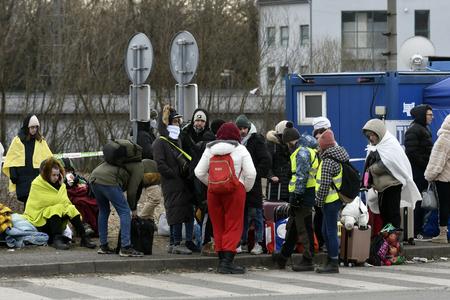
Requesting asylum is a lengthy process, it can take six months and in the meantime, people are usually placed in camps allocated for asylum seekers. While waiting for asylum, the applicants are not allowed to get a job.
The fastest way is to ask for temporary protection, which allows people to not only to stay in Slovakia, but also receive accommodation, food, health care and permission to work.
It is possible to ask for temporary protection at the borders or later at the departments of the Foreigners' Police in Slovakia. These currently operate non-stop and are dedicated solely to Ukrainians fleeing the country.
. However, even after filling in the online registration, it is still necessary to arrive to the Foreigners‘ Police or large-capacity centre (Humenné, Michalovce, Bratislava) in person, but the process of issuing the confirmation on temporary protection should be faster if you fill in your data online in advance.
The temporary protection is valid until March 4, 2023. The government can decide to prolong it after evaluating the situation in Ukraine.
How do I find accommodation?
You are able to choose your own, according to which town in Slovakia you want to live in, whether you are looking for a flat to rent or you want to stay in a hotel. It depends on how much you want to pay for the accommodation.
There are groups on Facebook where people offer either their entire flats and houses for rent or at least rooms in the houses they live in. Most people do it for free. There are similar initiatives from hotels and local providers of accommodation who are helping people from Ukraine.
If you ask for temporary protection and you do not have accommodation yet, the state will find one for you.
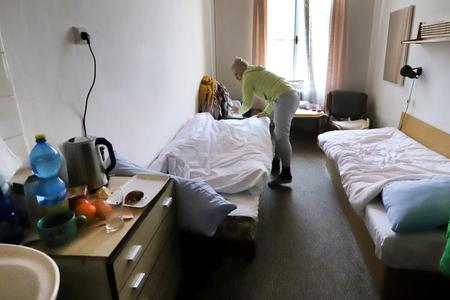
If you ask for temporary protection and already have a place to stay, you also have to sign a rental contract with the owner of the property or attach an affidavit of the property owners on offering the accommodation.
A website with more information on accommodation should be added. After the initial crossing the borders, refugees may immediately go to large-capacity centres in Humenné and Michalovce, where volunteers will help you arrange accommodation.
Please note that once you are registered at the Foreigners' Police with a certain address, every change of address has to be reported to the Foreigners' Police.
Can I apply for a job in Slovakia? Are there any conditions I need to meet?
Yes, you can, if you obtained temporary protection. No further work permit is necessary.
Be sure to check Profesia, Slovakia’s biggest website with vacant job positions. Profesia also launched a special form for applicants from Ukraine.
I need to go to the hospital, should I pay for a doctor's examination?
Again, it depends on whether you have arranged temporary protection status or you are just transiting Slovakia.
If you are transiting, you have to pay for health care on your own. If you have temporary protection, your health care fee is covered by the state. This means not only in case of emergencies, but also if a doctor recommends some more examinations.
If you need a dentist, here is a list of dentists who provide free-of-charge dental care for Ukrainian refugees.
I withdrew hryvnias in Ukraine, where can I exchange them for euros?
There are none or limited options to exchange hryvnias for euro in Slovakia. No big banks are trading in the currency (this was the situation before the war started as well) and smaller exchange services do not buy the currency because they have nowhere to sell it. There might be several exceptions.
It is recommended to bring your bank card instead of cash, if possible, because the withdrawal of euros from an ATM is possible with a Ukrainian card. Some Slovak banks have dropped the fees for such a withdrawal.
Can my underage children be enrolled in kindergarten and school? How do I proceed?
Yes, school attendance is compulsory in Slovakia until the age of 16. Your child can get into a kindergarten or school if they have the status of asylum seekers or temporary protection.
Once you have arranged the immigration paperwork, you should visit the kindergarten, primary or secondary school of your interest. It could be a school facility in the place of your residence.
After an agreement with the management of the school, your child will be enrolled in a class according to her or his age.
Before your child is enrolled, he or she has to undergo a paediatric examination to confirm that your child is able to attend school. The director will require this confirmation.
Education in most of Slovak schools is in Slovak. There is only one school in Slovakia with Ukrainian as the language of education: in Prešov, eastern Slovakia.
The Education Ministry also provides information in Ukrainian.
Is the Ukrainian Embassy in Slovakia open? How can I contact them?
There is a Ukrainian Embassy in Bratislava located in the Old Town. The address is Radvanská 4175/35, 811 01 Staré Mesto. The phone number is 02/592 028 10 and the e-mail is emb_sk@mfa.gov.ua. They also have a Facebook page.



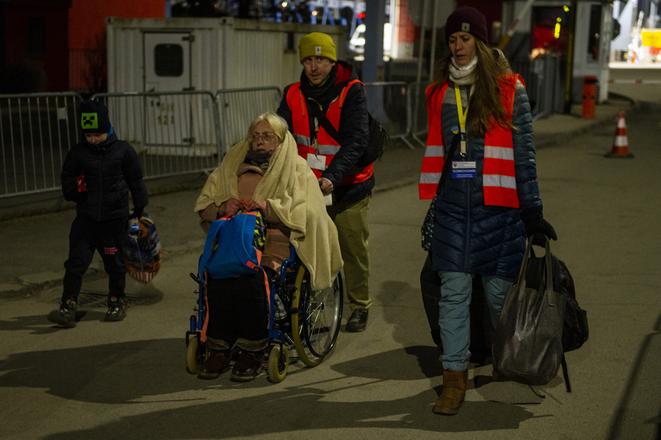 Illustrative stock photo (source: TASR)
Illustrative stock photo (source: TASR)
